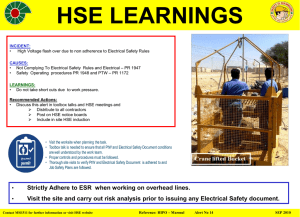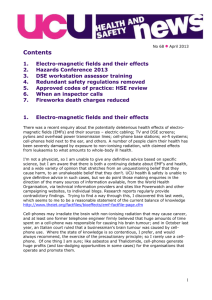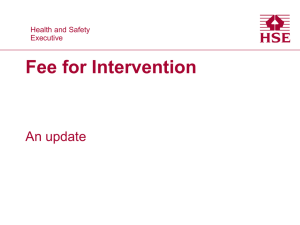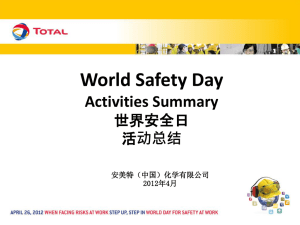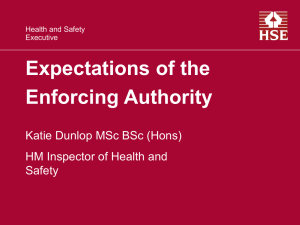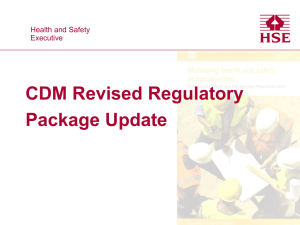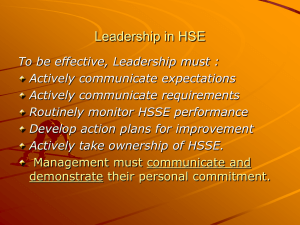Health and safety news 63, Oct 13
advertisement
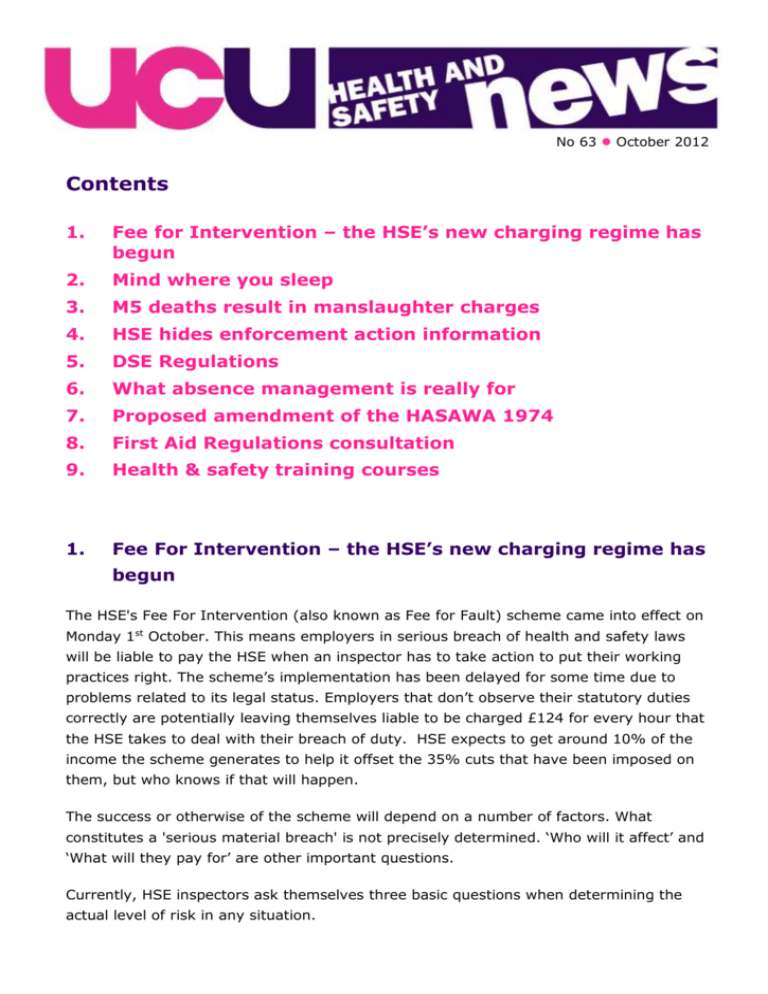
No 63 October 2012 Contents 1. Fee for Intervention – the HSE’s new charging regime has begun 2. Mind where you sleep 3. M5 deaths result in manslaughter charges 4. HSE hides enforcement action information 5. DSE Regulations 6. What absence management is really for 7. Proposed amendment of the HASAWA 1974 8. First Aid Regulations consultation 9. Health & safety training courses 1. Fee For Intervention – the HSE’s new charging regime has begun The HSE's Fee For Intervention (also known as Fee for Fault) scheme came into effect on Monday 1st October. This means employers in serious breach of health and safety laws will be liable to pay the HSE when an inspector has to take action to put their working practices right. The scheme’s implementation has been delayed for some time due to problems related to its legal status. Employers that don’t observe their statutory duties correctly are potentially leaving themselves liable to be charged £124 for every hour that the HSE takes to deal with their breach of duty. HSE expects to get around 10% of the income the scheme generates to help it offset the 35% cuts that have been imposed on them, but who knows if that will happen. The success or otherwise of the scheme will depend on a number of factors. What constitutes a 'serious material breach' is not precisely determined. ‘Who will it affect’ and ‘What will they pay for’ are other important questions. Currently, HSE inspectors ask themselves three basic questions when determining the actual level of risk in any situation. What harm could arise? How likely is it that the event leading to the injury or ill health will happen? How many people are likely to be affected? The answers to these questions will now help inspectors determine whether the new FFI powers can and should be used, in order to rectify the breach as quickly and effectively as possible. So, in what circumstances might FFI be applied? Possible area could include: Health risks – where failure to comply might lead to exposure to harmful substances such as dust, fumes and chemicals or to radiation, or energy such as noise or vibration. Safety risks – where the potential effects are immediate due to traumatic injury, e.g. contact with moving machinery, falls from height or contact with vehicles. Welfare breaches – requirements that are either part of the controls required for health risks, or are basic standards for people in a modern society. Management of health and safety risks – requirements related to capability to manage health and safety risks to a sustainable acceptable level. If, in the inspector's opinion, there is a material breach of law requiring some formal regulatory intervention through a letter, email, instant visit report, notice or prosecution, up to the point that court proceedings start, cost recovery will begin at the first visit that identifies it, through to the point that the breach is rectified, including all the time that an inspector and other colleagues or specialists spend on the case. The longer a breach remains uncorrected, the greater the potential cost to the employer. That seems like a reasonable incentive for employers to act quickly to repair breaches. This should, it is hoped, reduce the amount of bad practice occurring in the first place, leading to safer and healthier workplaces for us all. 2. Mind where you sleep Hotel chain Travelodge has been fined £13,000 and ordered to pay £6,500 costs after breaching fire safety law at its Gatwick Airport Central hotel. The company pleaded guilty to seven offences under the Regulatory Reform (Fire Safety) Order 2005, following a fire at the hotel. Fire safety officers were so concerned by the inadequacy of the fire safety measures that a prohibition notice was served preventing anyone from staying at the hotel until changes had been made. Travelodge were convicted of seven breaches: An inadequate fire alarm system Failure to review their fire risk assessment 2 Inadequate fire safety training for staff No planning, organisation, control and monitoring of fire prevention and protection measures Failure to properly maintain fire safety equipment Obstruction of escape routes Blocked fire exits Responding to the conviction, a Travelodge spokesperson said “The safety of our customer and our staff remains our number one priority throughout our 500 hotels.” Let’s hope they mean it. But they aren’t alone. Chescombe Ltd, the owner of Tantons Hotel in Bideford Devon, was fined £40,000 and ordered to pay £10,000 in costs at Exeter Crown Court. The prosecution followed a fire in May 2011 in which 55 people were evacuated, including four people who were trapped on the roof of the building and had to be rescued. This company pleaded guilty to five similar offences under the Regulatory Reform (Fire Safety) Order: failing to implement the requirements of the fire risk assessment; failing to provide adequate fire detection and alarm equipment; inadequate fire resisting doors; a failure to ensure escape routes were kept clear; and failing to maintain a final exit door and self-closing fire doors. UCU health & safety representatives should ensure that the employer’s fire risk assessments are up-to-date, that comprehensible information is available, and that regular training sessions are held for both staff and students, and results recorded. Our sample checklist can be used to conduct a workplace inspection of basic fire precautions, so you can check other aspects of the fire precautions. http://www.ucu.org.uk/media/docs/6/t/ucu_firecheck_revmar11.doc We, along with the fire authorities, recommend that at least one, and preferably two practice evacuations should take place every year, and that UCU H&S reps should participate as observers in those practice evacuations. We still hear stories that some members of staff won’t evacuate when the alarm sounds “because it’s only a practice”. That’s a management control failure and needs to be put right. More generally, we also recommend that any of our readers who stay in a hotel should spend a few minutes to make sure they understand the fire precautions information, and walk the route to emergency exits to familiarise themselves. 3 3. M5 deaths result in manslaughter charges Geoffrey Counsell, the man who organised and operated a fireworks display at Taunton rugby club in November 2011 that enveloped the M5 motorway in dense smoke causing a multiple vehicle crash, has been charged with seven counts of manslaughter. He will appear at Bristol Magistrates Court next month. The multiple vehicle collision was described as one of the worst British motorway crashes in memory. 7 people died and more than 50 were injured. This item was reported in the Daily Mail at http://www.dailymail.co.uk/news/article-2220532/Fireworksorganiser-charged-manslaughter-M5-motorway-deaths.html but you do have to wonder what the Mail would have reported if the event had been cancelled or refused a licence by the local council because of this kind of risk. It would probably have been 'Elf and safety killjoys deny children their bonfire-night fun' across the front page! I am sure the families of those killed and injured in this horrendous event wish that in this case health and safety had been rigorously, even, to use Daily Mail-style terminology 'overzealously' applied. 4. HSE hides enforcement action information Since the HSE recently revamped its website, the front page link to their enforcement databases has disappeared. This appears to be part of a culture of disappearance at the HSE; local office telephone numbers went a few years ago; a number of local offices themselves have disappeared over the past year; inspectors no longer appearing at universities to conduct unannounced inspections, and now the public records of enforcement action are less accessible. The enforcement databases list the names of employers who have committed breaches of the law, and had formal enforcement action taken against them. There are 2 databases, notices and prosecutions, that record offences and prohibition and improvement notices issued in the past 5 years. Earlier records are contained in two historical record sets also accessible from the home page. The home page is here http://www.hse.gov.uk/enforce/index.htm and links to all the databases. Always worth checking – search on name and type in university or college for relevant results. 5. DSE Regulations We have had a couple of DSE workstation assessment enquiries recently, so it’s worth restating our position. 4 University and college academic staff are increasingly reliant on internal networks for information about their work and about the student body. Many management instructions come via e-mail – I’ve heard of more than one case where a member in a staffroom gets e-mails from his supervisor, who sits at the desk across the room. The reason given for this failure to communicate personally is to ensure there is a paper trail if a dispute arises! All workstations are required to be assessed, not just those of “designated users”. (Employers usually interpret “designated user” to apply only to staff such as data processors who work pretty-much fulltime on-screen. Under the DSE Regulations, employees who are "designated users" are entitled to free eye tests on request, and then periodic re-tests. If such tests reveal that the provision of appropriate corrective devices is necessary - an additional pair of specs for on-screen use that are different to your distance or reading prescription - the employer must supply these free of charge. Some employers have arrangements with a local optician or a national chain for staff eye tests and spectacle provision. Like much of health & safety regulation, the question of designation has always been one open to interpretation - employers often say that academic staff cannot be users as they don't spend enough time on the DSE - but we say that these days, a lecturer cannot do their job without spending lots of time on screen, where most management information comes via intranets and e-mails, and the whole range of student admin is on-line. Currently on-line marking of exam and other scripts is growing in popularity with employers, and we have reported earlier that some Branches and LA’s have successfully challenged compulsion in this respect. In one other university pilot, staff managed to negotiate the provision of an e-book reader onto which scripts were loaded, and a laptop with the appropriate marking software – bribery or successful negotiation? UCU recommends that all academic staff be designated as users, and some institutions already do that. http://www.hse.gov.uk/pubns/books/l26.htm for the DSE Regulations & Guidance booklet and other detailed information. Guidance paragraph 15 to the DSE Regulations defines circumstances where UCU H&S believes covers the work of our academic members: “Where it is clear that use of DSE is more or less continuous on most days, the individuals concerned should be regarded as users or operators. This will include the majority of those whose job mainly involves, for example DSE based data input or sales and order processing. Where use is less continuous or frequent, other factors connected with the job must be assessed. It will generally be appropriate to classify the person concerned as a user or operator if they: 5 (a) normally use DSE for continuous or near-continuous spells of an hour or more at a time; and (b) use DSE in this way more or less daily; and (c) have to transfer information quickly to or from the DSE; and also need to apply high levels of attention and concentration; or are highly dependent on DSE or have little choice about using it; or need special training or skills to use the DSE.” In May this year the HSE served Improvement Notices on a college for failure to perform suitable and sufficient analysis of DSE users’ workstations; failing to reduce the risks identified as a consequence of an assessment; and failure to ensure DSE users were provided with adequate H&S training in the use of workstations. 6. What absence management is really for More than 600 staff were dismissed from the Department of Work and Pensions (DWP) last year for their poor work attendance, according to figures just released. Video conferencing firm LifeSize made the request under the Freedom of Information Act, which revealed that 672 people were sacked for “unsatisfactory attendance” and 54 were disciplined for “unauthorised absence”. It also found that the average number of sick days a year at the department was 7.4 per employee with a total of 700,890 work days lost, with stress accounting for one in ten days lost to sickness. The figures also revealed that the Ministry of Justice took the most days off ill in 2011 at an average of 8.9 per employee, with 21.7% of the 635,554 sick days being attributed to stress. In addition, 36 staff were disciplined for their absence, with 11 being carpeted for abuse of sick leave procedures and 23 for being absent without leave or late. 7. Proposed amendment of the HASAWA 1974 As part of the Enterprise & Regulatory Reform Bill currently going through the parliamentary process, the government has, at the last minute in the House of Commons Report stage of consideration of the Bill, proposed an amendment to HASAWA Section 47 that appears to remove the right of an injured worker to make a civil (compensation) 6 claim against an employer, on the basis that the injury resulted from a statutory breach by the employer. The briefing from Thompsons solicitors circulated by IER can be accessed here http://www.ier.org.uk/sites/ier.org.uk/files/ERRB%20civil%20liability%20briefing% 20final.doc ; the original amendment document containing the full text of the proposed amendment is here http://www.publications.parliament.uk/pa/bills/cbill/20122013/0061/amend/pbc0611110a.pdf and you can find S47 of HASAWA yourself. Thompsons circular says that the government appears to be taking the recommendation from the Lofstedt report about strict liability as consultation on this measure, but there remains some debate about whether-or-not the state is required to consult on changes in primary legislation. It isn’t really clear what the implication of this amendment will be for the conduct of cases – every civil case has to show that the employer was negligent, and as a result of that negligence harm was caused. But there probably is, as Thompsons says, some form of threat. We’ll keep you updated – Hilda Palmer of the Hazards Campaign is on the case with contacts at Thompsons and elsewhere. 8. First Aid Regulations consultation CD248 – A consultation on the proposed removal of the requirement for the Health and Safety Executive to approve first aid training and qualifications, a review of the Approved Code of Practice and the content of associated guidance This Consultative Document seeks views on proposals from HSE to amend Regulation 3(2) of the Health and Safety (First-Aid) Regulations 1981 (S.I. 1981 No. 917) as amended and is intended to build upon the views sought in stakeholder consultation conducted by HSE on the proposed amendment earlier in the year. The amendments are in response to a recommendation in Professor Löfstedt’s report "Reclaiming health and safety for all: An independent review of health and safety legislation", and relate to the regulation of first-aid at work. HSE is consulting on the proposed removal of the requirement for HSE to approve first aid training and qualifications and a review of the associated Approved Code of Practice and the content of revised guidance to support employers with the changes. Specifically, HSE seeks views on what guidance would be useful to businesses when assessing what they need in terms of first aid provision for their particular circumstances; and in the selection of training providers. 7 These changes are part of HSE’s work to make it easier for businesses and other users to understand what they need to do to comply with health and safety law, and will be of interest to businesses of all sizes and from all sectors. This link takes to all the information you need in order to respond. http://www.hse.gov.uk/consult/condocs/cd248.htm This consultation ends on 3 December 2012 9. Health & safety training courses There are still places available on the forthcoming courses in Manchester, 14th–16th November, and Taunton 26th–28th November. More information and applications to Karen Brooks – kbrooks@ucu.org.uk Contact UCU Health & Safety Advice UCU Health & Safety Advice is provided by the Greater Manchester Hazards Centre, and is available for 3 days each week during extended term times. The contact person is John Bamford: (e) jbamford@ucu.org.uk (t) 0161 636 7558 Visit the UCU Health and Safety web page: http://www.ucu.org.uk/healthandsafety 8
